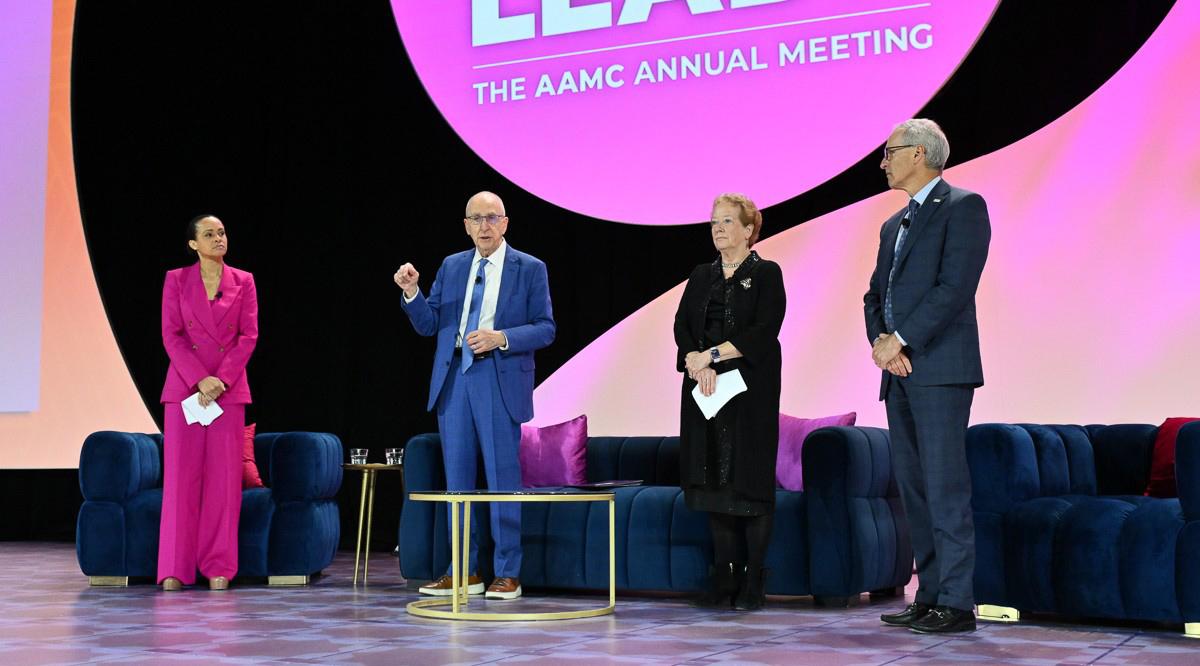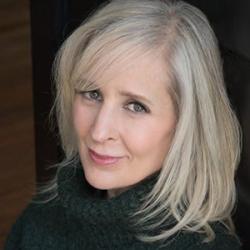Despite the cataclysmic challenges facing academic medicine today, the individuals and institutions responsible for delivering care, carrying out vital research, and training new physicians can succeed if they are guided by their core values, said AAMC President and CEO David J. Skorton, MD, during the Leadership Plenary at Learn Serve Lead 2025: The AAMC Annual Meeting on Nov. 3.
“We can expect that policies may shift, and systems may frustrate us,” he told an audience of several thousand. “This has certainly happened before, but the core of medicine, of caring for each other and for another human being, has always been unshakable and our mission to improve the health of people everywhere will remain our North Star.”
Critical moments of care and compassion
The plenary session began with a fireside chat between Skorton and AAMC Board of Directors Chair Julie A. Freischlag, MD, CEO of Atrium Health Wake Forest Baptist in North Carolina, who shared stories of patients who profoundly affected them.
Freischlag recalled guiding the emergency treatment, including surgery, of a patient, Jack, with a ruptured abdominal aortic aneurysm and then following the man and his wife, Shirley, for many years after the successful operation. The experience contributed to the understanding of when to screen for aneurysm and would inform future cases.
Freischlag was later alarmed when her mother developed a large aneurysm requiring emergency treatment and then learned that her family had a predisposition to the condition.
“The research you do may affect your own family,” she told the attendees. “I will always think of Jack and Shirley,” among the many other “generous patients,” who form a vital part of clinical research.
Skorton told the story of a patient with a congenital heart defect, then in her mid-30s, who developed heart failure but was not a candidate for a heart transplant. She was eventually put on life support. When the time came to end the life-extending care, it was Skorton who turned off the machines that were keeping the young woman alive.
“She didn’t want anyone else to do it,” he said. “That was the hardest thing I’ve ever done in clinical medicine. It isn’t that we don’t know that we can’t always win, that we can’t save everybody, but to do it was very hard, and it was her father that provided the comfort to me.”
Another patient with complex heart disease also stood out for Skorton. The 19-year-old and his father, a pastor, wanted to go camping and ford a stream in a canoe but worried about the risk to the son’s heart. Although Skorton and his colleague advised them of the risk, father and son ultimately decided to go forward. Sadly, the son died during the trip.
“My partner and I went over and over it — did we explain things well enough? Should we have been more forceful?” Skorton said. “And it turned out that the person who brought us comfort was the father, the pastor, who was used to comforting people and helping them see that sometimes life doesn't always go the way we hope or pray.”
“With all the stresses, challenges, and the uncertainties we’re going through now, we have to ask ourselves why did we go into this profession?” Skorton continued. “It was not always to win; it was always to try. It was not always to succeed, but it was to try. It was not always to come out the other end as we dreamed it should be, but it was to try.
“And most of the time, it works out well because of education, because of science, and because of technology, and because of all the things that we are working to protect right now. But the comfort and the wisdom can come from other places.”
Facing the moment
Skorton and Freischlag were next joined by AAMC Board of Directors Chair-elect Michael Waldrum, MD, CEO of ECU Health, and Emmy Award–winning journalist and ABC News Live “Prime” Anchor Linsey Davis, who facilitated a wide-ranging discussion about the challenges currently facing academic medicine. Uncertainty was a key theme.
When asked how the AAMC has made decisions during the chaos of the moment, Freischlag said, “We really relied on our inner resilience. You have to hunker down and pay attention. We really listened to our body and mind, and we learned to respond and not react.”
Although the crisis is far from over, it has sharpened the focus on what matters in medicine, Freischlag said, offering trainees two pearls:
- Keep your North Star. “I ask myself every day, what did I learn today?” she said. “Did I help anybody to get to where they need to be?”
- Remember who you work for. “You actually work for your patients,” Freischlag said. “You work for your students. You work for your partners, your colleagues, and your community.
“Remember who you work for and make sure you do something to make a difference every day, and you will reap the benefits of people coming to you with problems early, coming to you with solutions early, and coming to you to say, ‘thank you,’” she said.
The uncertainty of National Institutes of Health funding has downstream effects that could have significant implications. Skorton expressed deep concern for the two core elements for biomedical research: “the investigator initiation of the ideas of research and peer review of the research applications. Nobody should tell the community [that] the research has to go this way or that way,” he said.
Such concerns are among the things that keep AAMC leadership awake at night.
According to Waldrum, “Sometimes our organizations separate, but the thoughtful response to uncertainty is staying united, understanding our true values, standing up for those, and being steadfast in that, and not letting the pressure pull us apart.”
“That's why I love this meeting, because when we get together, we talk about those things,” he said. “We have to engage and respect each other and the incredible roles we have and navigate these difficult times together.”
Although uncertainty is today’s reality, Skorton was clear on one thing.
“Anything that gets in the way of us being able to deliver care and improve the health of people everywhere, like limiting access to care or cutting Medicaid, that has to be an absolute no, because it flies in the face of our mission,” he said. “You can't improve people's health if they don't have access to care. All the innovation, the technology, and the good intentions in the world are not going to work if we can't bring those people into systems of care.”

